
It was an encouraging year for cinephiles. And we have a doll and a physicist to thank.
The phenomenon of “Barbenheimer”—that is, the films Barbie and Oppenheimer, which were released on the same day this summer—was many things: An internet meme turned marketing gimmick. A triumphant return of the double feature. A point of pride for those who saw the films back-to-back on opening day.
But mostly, it was an indication that good films, not based entirely on IP (okay, Barbie was…but with a twist) still have an audience.
Oppenheimer was a particular surprise—a three hour film about the making of the atomic bomb that, as many critics pointed out (including this one), mostly consisted of talking—so much talking. And yet, in the hands of a master like Christopher Nolan, it managed to thrill. The aforementioned twist of Barbie, the year’s biggest film, was that it was an auteurist take on the Mattel doll, a candy-colored, whipsmart feminist dreamscape that was a send-up of the very thing it was meant to celebrate. I was dazzled by it, just like everyone else, but found its themes of female empowerment a bit heavy-handed and trite, so it only made my “honorable mentions” this year.
Of course, Hollywood being Hollywood, they’ll take away all the wrong lessons from the Barbenheimer phenomenon. We already know that an American Girl Doll film is in the works—insert massive eye roll. And I wouldn’t be surprised if a film about Albert Einstein was also in the pipeline. What’s more, we know some studios are going to try to replicate the “Barbenheimer” model by releasing contrasting high profile films on the same day in the hopes of creating another wave of memes. Silly studios, don’t you know these things need to happen organically?
Still, all told, it was a good year for film—not just because the movies were quite good (they were) but because audiences really demonstrated an appetite for films that weren’t just Marvel, Star Wars, or DC Comics. Martin Scorsese’s Killers of the Flower Moon, a three-and-half-hour epic (with no potty break!) about a dark and little known period of American history, raked in $67 million domestically—not Barbie numbers, but nothing to sneeze at. (The banality of evil was an overarching theme in 2023, by the way—seen not just in Scorsese’s epic but Oppenheimer, Saltburn, and the unsettling Zone of Interest, about a Nazi commander who lives contentedly with his family next to Auschwitz, a film I saw on my laptop and need to see again in a theater to truly assess.)
And speaking of dolls, the camp horror film M3GAN, about a lifelike doll gone rogue, managed to tap into our anxieties about AI and inspire a thousand fabulous Halloween costumes. It raked in a hefty $95 million domestically. The films that were original, auteur-driven, and creatively bold were the ones that ruled the year. Let’s keep it up, Hollywood.
With that, here are my 15 favorite films of 2023. (In some cases, I am using excerpts of my own full-length reviews.)
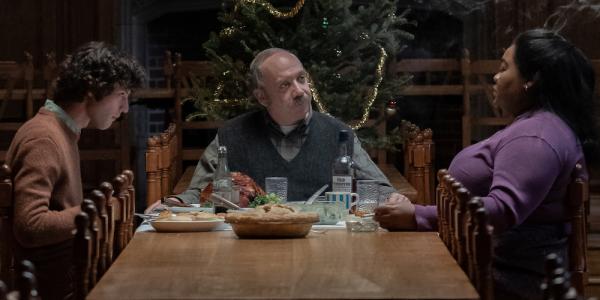
1. The Holdovers
The oxymoronic phrase “instant classic” has always bugged me—only time will tell if something is truly a classic. And yet, the minute I saw Alexander Payne’s wise, mordantly funny, and sneakily sentimental The Holdovers, I knew I would want to revisit it again and again. Set in 1970, with a look straight out of The Paper Chase, it tells the story of a curmudgeonly and ostentatiously principled teacher (Paul Giamatti) saddled with a sad and surly boy (Dominic Sessa) during the Christmas break of a New England prep school. The film takes its sweet time in allowing these two prickly outsiders to warm up to each other, making their ultimate bond all the sweeter. A third character, a kindly cafeteria manager (Da’Vine Joy Randolph) who bears the impossible weight of the loss of her son in Vietnam, becomes the mother figure in this unlikely surrogate family. It’s a Christmas film for people who don’t love Christmas films and yes, an instant classic.
My full review. (The Holdovers is in theaters and available on demand.)
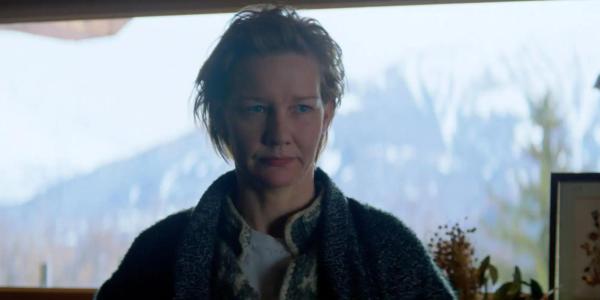
2. Anatomy of a Fall
What would you do if your mother was accused of killing your father—and you weren’t completely convinced of her innocence? That’s the premise of Justine Triet’s tense and slippery courtroom drama, Anatomy of a Fall, a film that gets under your skin and stays there. Sandra (a masterful Sandra Hüller) and Samuel (Samuel Theis) are having trouble in their marriage, stemming from several things, among them an accident which left their young son blind (they each secretly blame the other) and the fact that her writing career is thriving while his isn’t. Couple that with a dormant sex life—she sleeps with women on the side; he grudgingly accepts it—and it’s a recipe for an extremely tense home life. Samuel has a nasty habit of playing his music incredibly loud to get under Sandra’s skin. And one day, after just doing that—the song in this case, for maximum irritation, is a reggaeton version of 50 Cent’s “P.I.M.P.”—he ends up dead on the snow-covered ground in front of their log cabin. Did he fall from the attic window—or was he pushed?
In the courtroom, Sandra encounters all the misogyny you might fear—an accusation that she stole Samuel’s ideas for her own gain, an intimation that she’s a man-hating lesbian or, worse yet, a crazed one. And young Daniel (Milo Machado-Graner) is the only “witness”—although he must rely on his other senses to recreate the events of that day. At one point, he becomes angry at his mother, somewhat convinced of her guilt, but gradually, his memories change to become more favorable to her case—is he lying for her? And if he is, does that necessarily mean she’s the killer? Believing in someone’s innocence, the film argues, is always a leap of faith.
(Anatomy of a Fall has just left theaters. No streaming date has been set.)
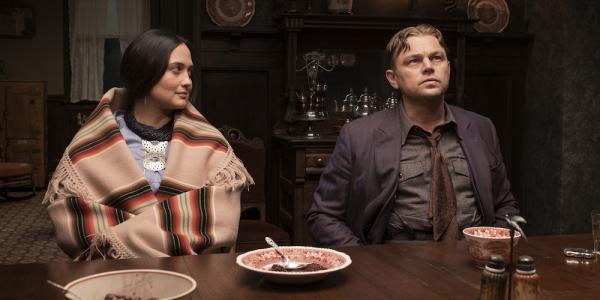
3. Killers of the Flower Moon
Martin Scorsese always makes wildly entertaining films about terrible men. Killers of the Flower Moon is also about men doing terrible things—in this case, marrying and murdering Osage nation women so they can inherit their oil—but for the first time, he keeps his lens focused on the victims, the Osage women themselves. Yes, the stolid, greedy Ernest (Leonardo DiCaprio) is the film’s main character, but it’s his bride, the wary and tentatively open-hearted Mollie (an astonishing Lily Gladstone) who is the film’s soul. Ernest’s uncle, “King” Bill Hale (Robert DeNiro) is the film’s true villain. He pretends to be a benevolent white man, a friend to the Osage, while actually masterminding their murders. In a lesser director’s hands, this film could be too grim to bear, but Scorsese manages to inject urgency and excitement into every frame, even the quieter moments. The film ends on a remarkable bit of fourth-wall breaking commentary, where Scorsese seems to interrogate his own body of work by asking the question: Whose stories get told and why?
My full review (Killers of the Flower Moon is now available on demand.)
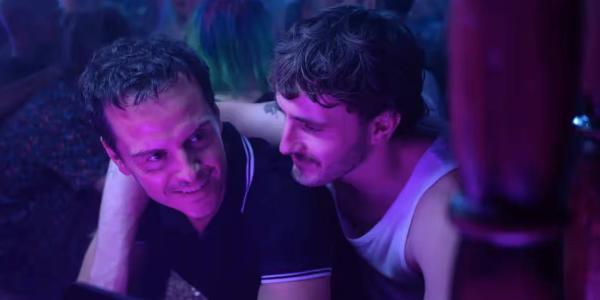
4. All of Us Strangers
In Andrew Haigh’s heartbreaking film, a lonely gay man named Adam (Andrew Scott) is navigating two unexpected events: He has met a handsome stranger (Paul Mescal) in the new apartment complex where he lives and he has begun visiting his parents at his childhood home. But there is a twist: He hasn’t lived in that home since he was 12, which was how old he was when his parents died in a car crash. Mom and Dad (Claire Foy and Jamie Bell) are there, frozen in time, with outdated ’80s clothes and hairstyles, actually bit younger than he is now—but still, parental, doting. Meanwhile, the neighbor, Harry, becomes his lover—an uncommonly kind and tender one; it opens him up. Together, the two men unpack their traumas—the trauma of growing up gay and closeted, of the specter of AIDS, of losing one parents, or, in Harry’s case, getting rejected by his. So what exactly is happening here? Is Adam cracking up? Is the film supernatural? Haigh never fully answers that question—nor should he. The film, which is exquisitely acted by its four leads, especially Scott, is about loneliness and the need for connection. It’s about the particular trauma of the gay male. But its themes of longing to be accepted—by one’s parents, by society, by a romantic partner—are universal.
(All of Us Strangers is coming to The Charles on January 12.)

5. Passages
There’s sex—and lots of it—in Ira Sach’s wonderful Passages, a complex, voyeuristically fascinating film about a love triangle where characters are revealed, through their desires. Tomas (Franz Rogowski), a bratty, but undeniably magnetic film director comes home after a party and proudly announces to his husband, Martin (Ben Whishaw), that he has slept with Agathe (Adèle Exarchopoulos). Martin accepts this news with surprising equanimity—he is clearly used to such provocations. Briefly, Tomas thinks he loves Agathe, but it’s possible he just loves the taboo of it all, the disruption he has caused in everyone’s life. When he finally realizes it’s Martin he really wants, will it be too late to repair their marriage?
My full review. (Passages is now available on demand.)
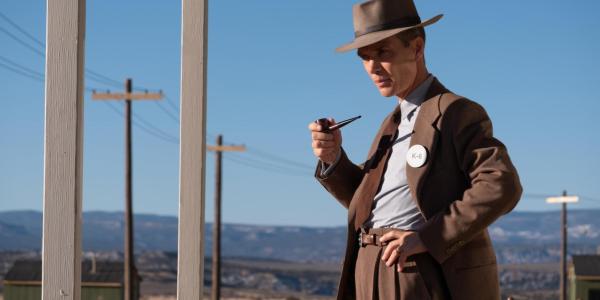
6. Oppenheimer
Just because science can, does that mean it should? That’s the question at the heart of Christopher Nolan’s explosive (pardon the pun) Oppenheimer, an absolutely jaw-dropping cinematic achievement about the creation and deployment of the atomic bomb. The film works on numerous levels. It’s a character study of the brilliant and obsessive J. Robert Oppenheimer (Cillian Murphy)—a man whose ego ultimately got in the way of his principles. It’s a philosophical contemplation of how the thirst for knowledge and the pursuit of power can intersect in catastrophic ways. And it’s a riveting procedural, about the creation of the atomic bomb and its aftermath. There are lots of scenes in classrooms and courtrooms—and tons of great supporting work by the likes of Robert Downey Jr. (as a friend turned jealous rival) and Emily Blunt (as Oppenheimer’s long-suffering wife)—but the scene that will stay with audiences most comes after Oppenheimer’s mighty bomb is first deployed. As Oppenheimer’s underlings cheer him on like a conquering hero, he’s overcome with a feeling of dread.
My full review. (Oppenheimer is now available on demand.)
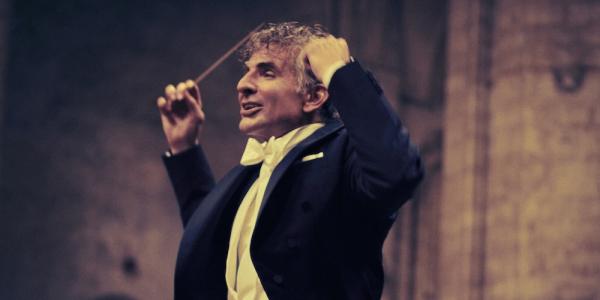
7. Maestro
Yes, there are parts of Leonard Bernstein’s life that Bradley Cooper left out—I, for one, wanted to see much more about the making of West Side Story and Candide. And yes, the prosthetics occasionally distract, especial in the film’s first third or so. But man oh man, this is the good stuff—a sumptuous, old-fashioned biopic, emotional and involving, delivered to near perfection. Cooper smartly chooses to focus on Bernstein’s loving but fraught relationship with his wife, Felicia (Carey Mulligan), who knew her husband was gay, but thought she was okay with it. (She wasn’t.) The film, which guides us smoothly from the ’40s to the ’80s, from his breakthrough conducting performance at Carnegie Hall, to his days as classical music’s greatest (and most glamorous) American ambassador, has immaculate costumes and set design in support of two colossal lead performances. It argues that Bernstein was a man of great appetites—for love, for sex, for conversation, and mostly for music.
My full review. (Maestro is now playing in theaters and on Netflix.)
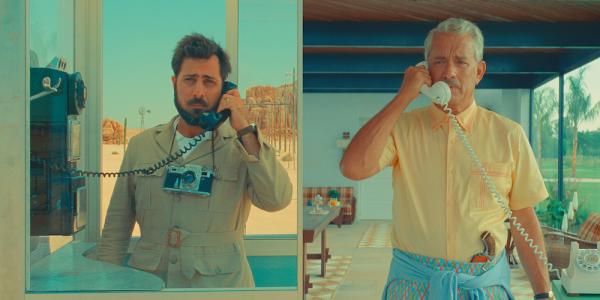
8. Asteroid City (and The Wonderful Story of Henry Sugar)
I’ve described Wes Anderson as like cilantro—you either love him or he leaves a bad taste in your mouth. I’m Team Anderson (and cilantro, for that matter—I wonder if there’s a corollary). So what a treat to get not just a Wes Anderson feature film this year, but four shorts, all available on Netflix. Among those shorts was The Wonderful Story of Henry Sugar, a bewitching tale of a yogi (Ben Kingsley) who can see while totally blindfolded and the eccentric millionaire (Benedict Cumberbatch) who becomes obsessed with this ability. But the main course was Asteroid City, a film that somehow manages to be a TV show, a play, a backstage drama, and a meta commentary on all of the above. It largely takes place at the Junior Stargazer competition in “Asteroid City,” a sparsely populated town (one diner, one motel) so named because an asteroid once landed there. Its main character is a widower father of four (Jason Schwartzman) who doesn’t quite have the heart to tell his kids that their mother died. Other characters include Tom Hanks as the kids’ cantankerous grandfather, Tilda Swinton as the astronomer who oversees the compound, and Scarlett Johansson as a languorous starlet who starts a romance with the widower.
But as mentioned, the film occasionally pulls back—showing us the making of the original Asteroid City play (we’re now watching the teleplay) and assorted behind-the-scenes dramas. What exactly is going on here? I’m not entirely sure, to be honest. But through it all, Anderson is clearly reflecting on grief, on man’s place in the universe, on the euphemisms we tell ourselves about stars and heaven and death. He’s also reflecting on the power of images and storytelling—even within this elaborate, self-referential framework, I got completely caught up in the characters and story.
My full review. (Asteroid City is now available on Prime Video.)

9. Showing Up
At the art center where Lizzy (Michelle Williams) works in Oregon, it seems that everyone is a working artist. But there’s a hierarchy, of sorts. Lizzy, who works in the office and sculpts on the side, feels somewhat dismissed by her more successful landlord and neighbor, Jo (Hong Chau), who keeps promising she’ll get the hot water back on in Lizzy’s house just as soon as she finishes her two upcoming exhibits. “I have an exhibit, too,” Lizzy mutters, lamely. Later, Lizzy finds herself caring for an injured pigeon that has been passive aggressively foisted upon her by Jo. She’s also looking after her father (Judd Hirsch), a ceramicist himself, who seems to have given up on art (and maybe life) and her troubled brother (John Magaro). She is put upon, insecure, but driven to make art—and we root for her. Director Kelly Reichardt captures the daily rhythms, roiling creativity, and various artistic rivalries and collaborations of this art center with a keen eye, wry wit, and remarkable, tender insight.
(Showing Up is available on Showtime and on demand.)
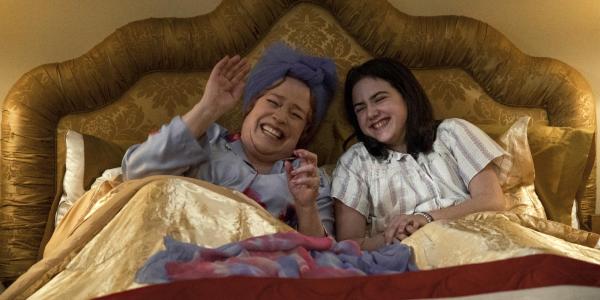
10. Are You There God, It’s Me Margaret
Worth the wait. Fifty-three years after the publication of Judy Blume’s seminal novel about the inner life of 11-year-old Margaret, who’s freshly relocated from Manhattan to the Jersey suburbs and rudely encountering popular girls, religious uncertainty, and puberty, we get Kelly Fremon Craig’s charming adaptation, filled with affection for both the novel and its characters. Craig doesn’t try to ramp up the drama. She accepts it for what it is—life or death to Margaret (a winning Abby Ryder Fortson), a bit mild to the rest of us. Craig deftly highlights the book’s humor, from the infamous chant of “we must, we must, we must increase our bust!” to Margaret’s hormones stirred by the sight of her crush’s underarm hair. With Kathy Bates as Margaret’s drama-queen grandmother left behind in New York (“I read when you don’t have any loved ones around your life expectancy drops drastically”) and an excellent Rachel McAdams as Margaret’s sympathetic mother, who is having her own (mild) crisis of identity. The film’s gentleness, its goodness, feels a bit like a tonic.
My full review. (Are You There God, It’s Me Margaret is available on STARZ and on demand.)
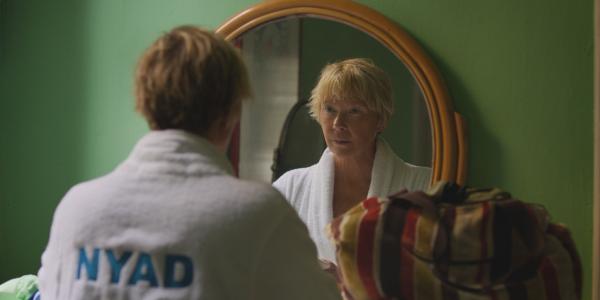
11. NYAD
Not a love story, exactly, but something more rarely explored and perhaps even more interesting—the story of best friends as soulmates. Annette Bening is the titular long-distance swimmer—stubborn, brave, self-aggrandizing. Jodie Foster is her best friend and coach, who loves her, admires her, and is aggravated by her in equal measure. Not just a pitch-perfect (and exquisitely acted) character study, but a riveting adventure film, too—the scenes of the 64-year-old Diane Nyad attempting to swim from Cuba to Florida, will take your breath away.
My full review. (Nyad is available on Netflix.)
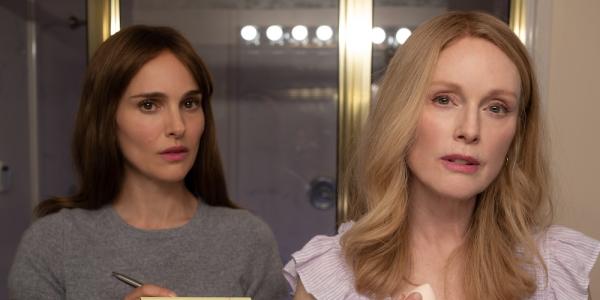
12. May December
Elizabeth Berry, the striving, B-list actress played with almost vibrating ambition by Natalie Portman, takes things way too far in her attempt to understand the interior life of Gracie Atherton-Yoo (Julianne Moore), the notorious woman she is about to depict in an independent film. Gracie is not-so-loosely based on Mary Kay Letourneau, the 35-year-old school teacher who slept with a 13-year-old pupil, went to prison for her crimes, and later married the boy. Charles Melton plays the boy, now a 36-year-old man-child (with teenage children of his own), who still hasn’t comprehended that he was the victim of abuse. Director Todd Haynes foregrounds the doppelganger showdown between Berry and Atherton-Yoo, to brilliant and sometimes hilarious effect, while Melton quietly breaks your heart in the background.
My full review. (May December is available on Netflix.)

13. You Hurt My Feelings
Nicole Holefcener, the master of the chronicling the petty disruptions in the life of the bourgeoisie, is at it again. In this case, writer Beth (Julia Louis-Dreyfuss) discovers that her therapist husband (Tobias Menzies) has been lying about liking her latest book draft. This sends her into a spiral of self-doubt and recrimination. Meanwhile, he’s having his own crisis at work (he fears his patients disrespect him) and feels unsupported by Beth. As the minor disagreements between this loving couple metastasize, Holefcener dares to ask: Why do the ones we love annoy us the most?
My full review. (You Hurt My Feelings is available on demand.)
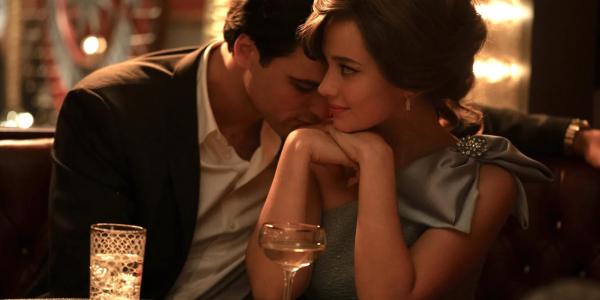
14. Priscilla
Another one of Sofia Coppola’s little lost girls, trapped in a meticulous gilded cage. This time, the auteur takes on Priscilla Presley (Cailee Spaeny), who meets (and is seduced by) a dashing young Elvis Presley (Jacob Elordi) when she’s still just a girl. He brings the initially besotted teen to Graceland—where she can have all the jewels and clothing her heart desires—and essentially never lets her leave. Elvis cheats, abandons her for long stretches of time while he’s on the road, and tries to control her ever move. At first the fear of losing him, which he wields like a weapon, is enough incentive to stay. Eventually, she comes into her own. The scene where she finally pulls away from Graceland once and for all is pure catharsis.
My full review. (Priscilla is available on demand.)
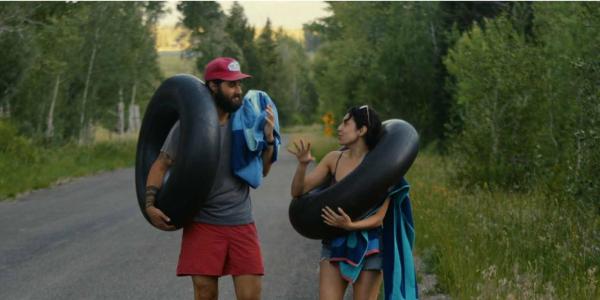
15. Peak Season
How this one got lost in the shuffle is beyond me. I caught this smart, quirky film at the New/Next film festival and absolutely loved it. It’s an off-beat love story of sorts, about a stressed out city gal (Claudia Restrepo) who falls for an off-the-grid wilderness guide (Derrick Joseph DeBlasis) while vacationing with her Wall Street-bro fiancé in Wyoming. She, like many others, idealizes the guide’s easygoing lifestyle, the loose rhythms of his life. But the scales fall from her eyes when she realizes he might not be quite as carefree as he seems. My full review. (At this time, there is not streaming date set for Peak Season but it will likely become available on MUBI.)
Honorable Mentions: Air, Barbie, Dungeons and Dragons: Honor Among Thieves, Ferrari, Past Lives.
As of this writing, I still have not seen Poor Things, American Fiction, or The Color Purple. Look for reviews of those titles coming soon.
